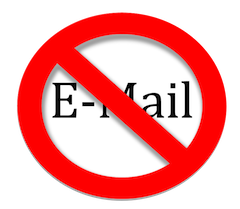I stumbled across a nice blog post the other day suggesting that there’s a simple solution to the problem of email killing employee productivity, and it’s basically this: “Keep emails short.”
While that may seem obvious and self-evident, it’s nevertheless something nobody seems to be able to do — far too many people write emails as if they were authoring the next great novel or a dissertation on the meaning of existence under the mistaken impression that more words are better.
But when it comes to email — as Robert Browning taught us all in his 1855 dramatic monologue, Andrea del Sarto (Called “The Faultless Painter”) — less is more.
The email window itself may be at fault — its wide-open textual expanse all but cries out for logorrheic verbosity. Like the mythical siren’s call, it incites our childhood passion and unrealized dream of being a best-selling author of pompous word-smithery!
Or…it could be that people just can’t cut to the chase.
Regardless of the cause, shorter messages are better messages for one, simple reason:
Short messages get read.
 That’s right. Short messages get read while long emails — even the most carefully crafted ones — get skimmed at best, if not ignored altogether.
That’s right. Short messages get read while long emails — even the most carefully crafted ones — get skimmed at best, if not ignored altogether.
When busy employees ‘gloss over’ the text of an email, you get miscommunication which leads to missed opportunities, missed deadlines, and missed earnings calls — burying critical information three pages deep in an email is a recipe for business disaster.
Strangely, the people who often struggle to limit their emails to the recommended five sentences or less have little or no trouble coming in under the 140-character limit when using Twitter.
Why is that? Two words: Context. (See how I made that shorter?)
Most social networks only give you a tiny window to post in, and people psychologically see that as the limit (even though they could write up to 60,000 characters).
Brevity is the soul of productivity.
That one contextual cue unconsciously constrains people, forcing them to get to the core of their communication. People can’t hide behind a ton of nouns, adjectives or verbs — they have to come right out and say it.
As an added benefit, you never have to worry about people taking offense at your brevity. People expect messages to be short on a social network because unlike an email, a post isn’t a monologue, it’s the beginning of a discussion.
So while you could try to get coworkers to treat email messages as if they were social media updates, it’s probably better to just use an Enterprise Social Network and just let it happen organically.
To learn how tibbr can cut down on long-winded emails that “bury the lead” and kill productivity, try a free trial of the tibbr platform now.






